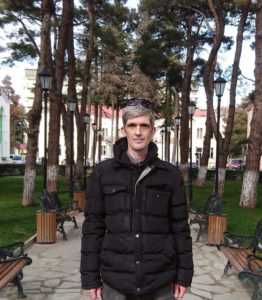 Author: Irma Kakhurashvili, Georgia
Author: Irma Kakhurashvili, Georgia
Our meeting with David Ananiashvili was appointed in a green courtyard of the Infectious Diseases, AIDS and Clinical Immunology Research Centre. The Centre is located in an old building in one of the central districts of Tbilisi, Georgia. The authorities have been promising a new working space for the centre since long ago, but so far there has been no progress in this process. However, David feels at home – he knows every corner here. He was one of the first people in Georgia who publicly spoke about their HIV status. David is the head of the Georgian Plus Group NGO. Since 2000, the NGO has been implementing various projects to protect the rights of people living with HIV and standing up to stigma and discrimination.
In the meeting room, David says that the civil society sector in the area of HIV/AIDS is quite small. Besides, there are not many resources available to fight stigma. In Georgia, all people have access to free HIV treatment (antiretroviral therapy is available and accessible for patients since 2004 through the grant of the Global Fund to Fight AIDS, Tuberculosis and Malaria), while stigma is one of the main factors hindering access to testing of HIV. David says that most stigma-related issues may be observed in health facilities, in the relations between doctors and patients. The HIV-related stigma in the healthcare system – both in state-run and in private clinics – is so strong that sometimes doctors and other medical personnel do not provide the required high-quality services. There have been cases when doctors refused to perform life-saving surgeries if their patients had HIV.
Stigma is reinforced by myths
The situation is worse in regions of the country, especially in smaller towns and villages where patients are afraid of social isolation and are reluctant to disclose their status even to their family members. Here, the HIV diagnosis still leads to the feelings of panic and helplessness as it used to be in the 80s.
“HIV is a stigmatized disease causing a number of emotional and social problems. Stigma is reinforced by a variety of myths, for instance, that HIV is a result of the person being irresponsible, practising immoral behaviours or using drugs,” explains David.
The community of people living with HIV in Georgia is not as open as it should be but David believes that everything has its time and that this issue may be resolved. Current scale of the response to hepatitis C may serve as a good example. Until 2015, people in Georgia had never talked out loud about this disease, but after the government started the national program of hepatitis C elimination the ice was broken: many people were able to recognize they had hepatitis and start effective treatment.
In the nearest future, hepatitis C elimination programme will also include screening for HIV, which means that the patients who are tested for hepatitis C will also be screened for HIV. The initiator of this idea – AIDS Centre – is sure that integrated services will significantly improve the HIV detection rates. David says that countering stigma requires a comprehensive approach instead of one-sided efforts.
Strategic plans
The estimated number of people living with HIV in Georgia is 12,000 people. Apart from countering stigma and discrimination, the main goal in the AIDS response is detection of the new HIV cases.
David says that there is a need to bring up the issue of preventive treatment of discordant couples in Georgia. Pre-exposure prophylaxis of HIV (PrEP) is a new method of HIV prevention. PrEP provides additional protection in cases when people do not use condoms for whatever reason.
David Ananiashvili and his colleagues plan to make their contribution to the development of a new National Strategic Plan to Fight HIV/AIDS. Its main objectives will be delivery of services to vulnerable groups and further scale up of prevention programmes.
“We would like to implement a new project by creating a consortium to make sure that in future our services – counselling centre, mobile clinics, outreach services, group activities, etc – and interventions are explicitly described in the HIV/AIDS strategic plan and to add new services to the existing ones. We will conduct focus groups, identify common challenges and needs to analyse and understand which services are needed for vulnerable populations and which of them are more effective,” says David.



